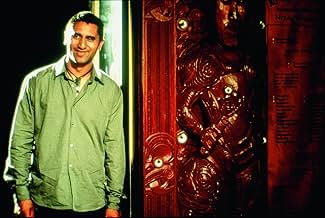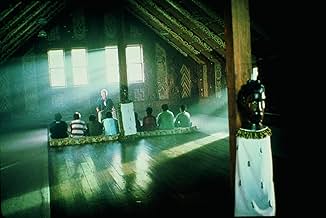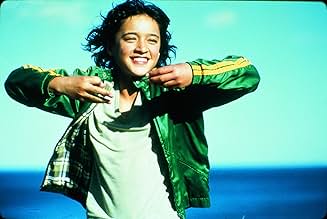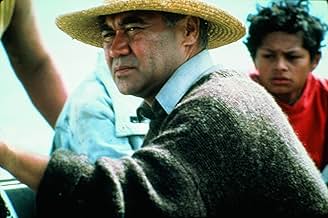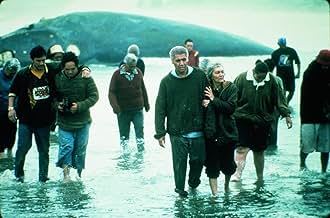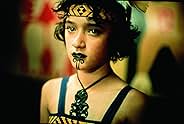Aggiungi una trama nella tua linguaA contemporary story of love, rejection and triumph as a young Maori girl fights to fulfill a destiny her grandfather refuses to recognize.A contemporary story of love, rejection and triumph as a young Maori girl fights to fulfill a destiny her grandfather refuses to recognize.A contemporary story of love, rejection and triumph as a young Maori girl fights to fulfill a destiny her grandfather refuses to recognize.
- Regia
- Sceneggiatura
- Star
- Candidato a 1 Oscar
- 33 vittorie e 35 candidature totali
- Maka
- (as Mabel Wharekawa-Burt)
- Hemi's Dad
- (as Roimata Taimana)
- Jake
- (as Tyrone White)
Recensioni in evidenza
The film presents a glimpse of the Maori society in New Zealand's North Island. Having visited New Zealand, but not being very familiar with the Maori culture, this film was a refreshing way to learn some aspects of it.
The story presented here has a lot to do with pride and tradition, which is a running theme among different cultural groups the world over. It has to do with the frustration of Koro by the defection of his eldest son, the designated heir of hundred years of a bloodline where only the males can carry the knowledge and the legends from one generation to the next.
Because of the rage Porourangi, the eldest son, feels after the death of his wife giving birth to twins, where only the female survives, he leaves his country and the baby girl is taken by the grandparents. The girl, Pai, will grow to be an enchanting girl who will be excluded from the teachings of her grandfather Koro. Even though he loves the girl, he can't deviate in his narrow vision of the world he knows.
Basically, it is a simple story very well told with a great performance by the child actress Keisha Castle-Hughes. This girl has such a strong magnetism while on camera that one tends to forget the rest of the other characters every time she appears. The grandparents are very well portrayed by Rawiri Paratene and Vicky Houghton.
This is a film for all ages to enjoy. Compare it with the latest releases from Hollywood, and it's no wonder to arrive at the conclusion that stories like Whale Rider have such an universal appeal that should be brought to the screen more often because of the positive way they show a society and its people at its best.
The story is a battle of wills between the tradition bound village elder Koro (solidly played by Rawiri Paratene) and his own grand-daughter Pai. Koro is seeking a new chief among the first-born sons of his village to inspire their tribe in its present day struggles in 21st century New Zealand. Pai senses in her heart that she is that new chief (despite her gender) and will not give up her quest to prove herself worthy of the task, even if she has to do her training surreptitiously outside of the eye of her beloved (but unbending) grandfather. This is all filmed in the actual Whangara tribal areas on the North Island east coast with the enthusiastic participation of the present day descendants of the original whale rider Paikea, who, as legend has it, was brought to shore on the back of a whale.
Although this film deals with a small corner of the planet, its values and inspiring messages are universal and should find a welcome audience everywhere. Everyone is already familiar with New Zealand as the location setting for Peter Jackson's epic trilogy of the Lord of the Rings and now they have a chance to discover something about the real people who live there and their heritage. Highly recommended. A 10 out of 10!
Screenplay author and director Niki Caro faithfully translated Witi Ihimaera's novel of the same name, a poignant and sometimes sad but ultimately uplifting story of New Zealand Maoris seeking, with the leadership of a difficult, stubborn and often harsh elder to sustain their peoples' values and customs.
Australia and New Zealand are both encountering, in politics and in culture (and often the two are inextricably linked), their shared heritage of white oppression of native peoples. Much of this history is unknown to Americans and Europeans who view Australia through a bird's eye picture of the Sydney Opera House and New Zealand with even fewer associational icons.
Recently, "Rabbitproof Fence" painfully depicted the policy of Australia to force lighter skin aborigines into "schools" where they would be nurtured to become "semi-whites" and then married to those of similar skin tone. The object was to bleach the blackness out of Australia and the horrors of this incarnation of cultural and anthropological genocide are on full display in that film.
"Whale Rider" takes a different and, in the end, perhaps a more powerful approach. There are virtually no whites in the film and only children's t-shirts and some music blasting from a boombox suggests the encroaching force of the controlling majority.
The cast is unknown to Americans and their names can be found on the IMDb homepage for the film. The lead actress, however, must be named. In the role of "Pai," a young girl whose mother dies at her birth along with her twin brother, is the extraordinary Keisha Castle-Hughes. She imbues every scene with a commanding and inviting vitality. Hers is an Academy Award (and any other major award) performance.
Pai's father left New Zealand for Europe, there to create and sell Maori crafts. She lives with her grandmother and grandfather, the latter some sort of unelected chieftain of the oceanside community. Bitter that no male heir will succeed him and alternately cruel and loving to his reluctantly acknowledged granddaughter, Koro starts a school to supplement the young boys' secular education with inculcation of the ways of the Maori. Pai wishes to join as an equal and is firmly, indeed harshly rebuffed at every turn.
If the Maori language has the phrase "You go, girl!," then it be directed towards the indefatigable but not arrogant Pai. It would have been easy to make her the kind of thoughtless rebel that nature often programs teenagers to be. The depth of her character resides in her simultaneous quest for equality and her understanding of her grandfather's unyielding attachment to patriarchal values. Pai's close relationship with her grandmother, a woman living a life universally recognizable to Americans, provides warmth and support and do some of her other relationships.
The story unfolds seamlessly with Maori music and rituals bridging the spoken dialogue (mostly in English, some in Maori with subtitles).
Partly a straight tale, partly a gripping mystical fable, "Whale Rider" never becomes saccharine.
The music and Maori songs complement but do not compete with the dialogue, a welcome change from many movies today. The land and the ocean are rawly gorgeous.
As in Australia, relations today between New Zealand's indigenous people and the descendants of their vanquishers are sometimes tense. There are open wounds from continuing political collisions over land and culture. The Maoris are not a monolith and internal dissension is active. Serious attempts to sustain Maori values and culture in the face of assimilative pressures meet with varied degrees of success (in Koro's Maori school the kids wear t-shirts with rock themes and one has a shirt advertising an upstate New York resort area if I saw correctly). New Zealand's most internationally renowned Maori is the opera diva Kiri te Kanawa who is now dedicated to Maori cultural restoration projects. "Whale Rider" can only give a boost to such efforts which, as this film shows, makes not only New Zealand but the world richer.
This is a film I will acquire on DVD as soon as it is available.
10/10.
Lo sapevi?
- QuizThe whales in the movie are a combination of footage of real whales, life size models (some with humans creating movement) and CGI. Keisha Castle-Hughes said the key whale riding scene took place 15-20 miles offshore, and was terrifying.
- BlooperThe father and grandfather argue after the slide show, and the father goes to pull down the white sheet that was hung over some drapes to act as a screen. He pulls it down, along with the rod and orange drapes that the sheet was hanging from. Moments later, the drapes are back up in place and hanging perfectly straight, without enough time for him to re-hang the drapes.
- Citazioni
[first lines]
Paikea: In the old days, the land felt a great emptiness. It was waiting. Waiting to be filled up. Waiting for someone to love it. Waiting for a leader.
[child birth scene]
Paikea: And he came on the back of a whale. A man to lead a new people. Our ancestor, Paikea. But now we were waiting for the firstborn of the new generation, for the descendant of the whale rider. For the boy who would be chief.
Paikea: There was no gladness when I was born. My twin brother died, and took our mother with him.
- Curiosità sui creditiDedicated to those who have gone before
- ConnessioniFeatured in The Making of 'Whale Rider' (2003)
I più visti
- How long is Whale Rider?Powered by Alexa
Dettagli
- Data di uscita
- Paesi di origine
- Siti ufficiali
- Lingue
- Celebre anche come
- Whale Rider
- Luoghi delle riprese
- Aziende produttrici
- Vedi altri crediti dell’azienda su IMDbPro
Botteghino
- Budget
- 3.500.000 USD (previsto)
- Lordo Stati Uniti e Canada
- 20.779.666 USD
- Fine settimana di apertura Stati Uniti e Canada
- 137.418 USD
- 8 giu 2003
- Lordo in tutto il mondo
- 41.062.976 USD
- Tempo di esecuzione1 ora 41 minuti
- Colore
- Mix di suoni
- Proporzioni
- 2.35 : 1
Contribuisci a questa pagina









